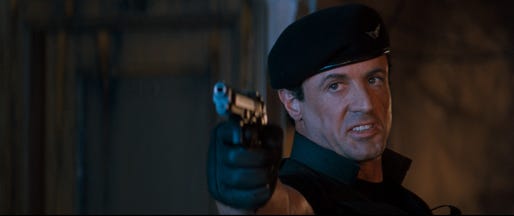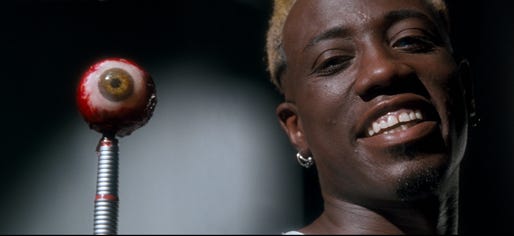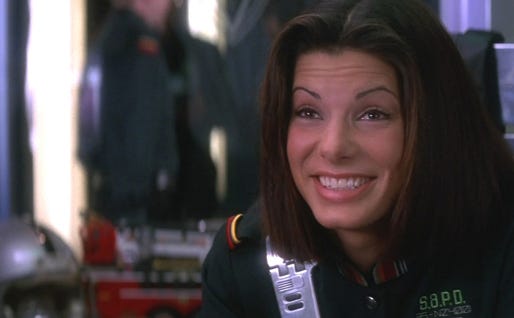Class of 1993: Demolition Man
In the “Class of …” series, we take a monthly look back at films celebrating either their 20th or 30th anniversary of initial release this year — six from 1993 and six from 1983. The rules: No Oscar nominees and no films among either year’s top-10 grossers.
When you’ve got bajillion-dollar franchises like Batman, Harry Potter and Middle Earth to boost your books, there’s little harm in occasionally writing down a novel oddity.
That’s why Warner Brothers rarely has had qualms rolling the dice over the last 15 years on risky big-budget projects built to tinker with tradition. Some of them, like “Inception” or “The Matrix,” achieved instantly iconic status. Many more, like “Sucker Punch” or “Speed Racer,” will spend eternity as mostly unloved misfits of the $5 DVD bin.
But the studio was bankrolling loopy gambles well before 1998. Like, say, an action movie set in 2032, featuring a soundtrack of oh-so-’90s Sting numbers and vintage 1960s ad jingles. One in which Wesley Snipes’ hair is incongruously bleached blond, like an action figure yanked straight from the package.
One in which Sylvester Stallone stars as a hero from the past, struggling to forge his way in a future where people “wipe” with three seashells after pooping.
Not for nothing does 1993’s “Demolition Man” open on a screen-filling image of the Hollywood sign in flames, for it torches almost every supposition that a film made to showcase Stallone and Snipes whomping on each other can only be brain-dead.
In fact, its sharp-witted satire and sharp-tongued sarcasm are practically the only things anyone remembers about it. It's certainly a minor work amid the crumpled-steel and shattered-glass spectacles on which action producer Joel Silver built his empire. With the exception of a tremendously thrilling third-act car chase (in which an Oldsmobile 442 puts self-driving, safety-first future cars to shame), the movie's “thrills” embody the era’s usual ethos – lots of blocky, lead-footed clobbering. (At least it takes place on expansive, practical sets, with handsome production design making up for a little bit of the lost gusto.)
It would seem that all of the greatest stuff in "Demolition Man" was spun by subversive screenwriter Daniel Waters — for whom “Demolition Man” was more or less a curtain call. After 1988's “Heathers,” a gold standard of teen satire, Waters worked on some of the weirdest blockbusters of the early 1990s.
First came 1990’s “The Adventures of Ford Fairlane,” which attempted to transform Andrew Dice Clay from vivid vulgarian into an action hero named after a car. Less than a year later came “Hudson Hawk,” the rare hybrid action-comedy-musical-vanity project. Although they were box-office bombs, both films were award-winners; Waters is the Tom Hanks of the Razzies, the only screenwriter to snag a Worst Screenplay trophy in two consecutive years. (In fact, every single film Waters touched in the '90s earned a Razzie nomination; for“Demolition Man,” it was, surprisingly, Sandra Bullock’s supporting turn and not Stallone, for whom 1993 was his first non-Razzie-nominated year since 1984.)
The next summer brought “Batman Returns,” far from a franchise favorite for most fans. Then, in 1993, Waters received first credit (ahead of Robert Reneau and Peter Lenkov, also credited with the story) on “Demolition Man.” (Since then, Waters has written and directed a pair of independent black comedies and penned the script for an adaptation of the popular YA novel series “Vampire Academy,” opening next year.)
In interviews, Jean-Claude van Damme has said “Demolition Man” was originally intended as a vehicle for him and Steven Seagal to square off — and that the script was different than what was filmed. Just hazarding a guess that “different” means “dumber,” as evidenced by the puerile puns that pepper nearly every punching scene.
Those banal moments aside, “Demolition Man” is a anarchically and enjoyably atypical ride — its spry, fast-paced script filled with unexpectedly hilarious utterances and constant cracks at conformity and complacency. Like Arnold Schwarzenegger’s “Last Action Hero” earlier in the year, it ultimately worked better as a wise-ass comedy than a wild action movie. (As “Action” was to Schwarzenegger, “Demolition” is to Stallone — an action star’s best comedy despite appearing in many other films tailored specifically to that genre.)
It also boasts a weird jumping-off point in “Brave New World,” Aldous Huxley’s controversial novel about the curdling of a utopian future. That connection starts obviously enough, as Bullock’s character is named named Lenina Huxley. (Every name in “Demolition Man” screams with yellow-highlighter symbolism: John Spartan, Simon Phoenix and Edgar Friendly, for starters, with added quirks like Dr. Raymond Cocteau and Alfredo Garcia for hardcore cinephiles.)
The movie also shares "Brave's" thematic crux of how power can become perverted in a utopia. Even if you’ve not read “Brave New World,” it’s not hard to guess which story resolves itself with candy-colored vibrancy and which one follows a downward spiral into despair, disillusionment and death.
Circa 2032, San Angeles — a Californian megalopolis formed by “the big one” of 2010 — is peaceful, placated and stable. People greet each other with a calm “Be well" and a wave, avoiding germ-transferring hand contact. There hasn’t been a murder in more than two decades. Graffiti and profanity are the worst crimes. Guns are gone, and police are much a figurehead as the Royal Family — armed with “glow rods,” which are like portable Vulcan neck pincers. Even sex has been neutered to its basest neurological response.
Childbirth is just as rigidly and effectively controlled. Caffeine, meat and alcohol have been banned because of their ill effects. Apologies are now known as “dehurtful retractions.” In an eerily prescient twist, Schwarzenegger has turned to politics, having become a past president of the U.S. All restaurants are now Taco Bell, which emerged victorious from the Franchise Wars, and the oldies station is all vintage ad jingles.
The population is carefully curated … and easily controlled by Cocteau (Nigel Hawthorne), whose technology has transformed this serene society — in which there’s even an evolved way to defecate. (The movie never explains how the three seashells work, but this explanation makes somewhat grotesque sense.)
Spartan (Stallone) and Phoenix (Snipes) come crashing into this seemingly placid future — relics of a violent past who were both cryogenically imprisoned in the 1990s. Phoenix is a sadistic criminal, having taken 40 innocent bus riders hostage in his gangland warren during the prologue. Spartan is a cop dubbed “the demolition man” for his history of large property-damage tabs. As portrayed, things tend to blow up around Spartan, not because of him. Such is the life of a misunderstood rogue cop.
Spartan finally takes down Phoenix, but not before he’s framed for the hostages’ deaths himself, and both men are put on ice — with calming psychological suggestions beamed into their synapses.
When Phoenix’s shackles unexpectedly open during a routine parole hearing decades later, he doesn't behave like the gentleman he’s been bred to be. Instead, he wreaks homicidal havoc with a force future cops have never seen and are ill equipped to stop.
When greenhorn officers played by Benjamin Bratt and Rob Schneider exchange an air-high-five for what they expect will be Phoenix’s imminent apprehension, it’s a good laugh in a couple of ways — one easy, one edgy. First of all, it’s clownish cartooning that coincides with their germophobic society. But it also feels, fleetingly, like Waters is taking shots at real-life California cops after their response to rioting in the early 1990s.
Who’d have thought that, of all people, Schneider would utter one of the sharpest bits of double-edged dialogue in the whole thing? When he whines, “We’re police officers! We’re not trained to handle this kind of violence!,” it’s both an ironic jab at the fictitious officers’ utter haplessness and an incidental indictment of real-life cops unable to respond to provocation in any sort of appropriate, peacekeeping way.
With no other options, the police thaw Spartan, the only man who brought down Phoenix in the first place, and pair him with Lenina, a cop obsessed with late-’90s culture so Silver can sneak in framed posters for his “Lethal Weapon” sequels.
The plot twists are neither particularly interesting nor unpredictable, as Phoenix becomes a patsy in Cocteau’s plan to permanently eliminate an underground resistance led by Friendly (Denis Leary, who freestyles some of his then-chic motor-mouthed MTV-ad shtick). Cocteau also never quite achieves the level of menace you know Hawthorne is capable of conveying. And the finale, in which Phoenix tries to thaw the world’s 80 worst criminals (including Jeffrey Dahmer), is better in theory than execution.
But all of "Demolition Man's" comic, and futuristic, details are delightful and deliciously savage. Its crown jewel is the Verbal Morality Code, through which profanity is a major offense and a klaxon sounds to print out a ticket whenever someone swears (even for “sotto voce” violations). It’s such a great joke, so faithfully represented in the echoes of the film's sound design, that you notice the errors in continuity when it doesn’t go off. Plus, Stallone is a perfect straight man to the joke, using it as a life-hack for the bathroom.
Other lively blasts of cynical humor pop up throughout, but save the shots at the cops, “Demolition Man” eschews scolding tones for foul-mouthed fun and lighthearted what-ifs. By ending on an edict that society’s mien should find a happy medium, it’s almost like a live-action “South Park” conclusion before “South Park” even existed.
Only by virtue of foreign grosses did “Demolition Man” end up in the black — far shy of that summer’s “Cliffhanger,” an adventure much more in the Stallone comfort zone. So, as Warner Brothers’ eight-figure gambles go, it was neither a classic nor a complete bust. But never doubt that it maintains some intriguing cultural ripples that linger today.
Just pay attention the next time you leave Walgreens with a blister-packaged cure for what ails you. Listen closely for the cashier’s serene sendoff to you.
What’s that? Oh, yeah. “Be well.”





